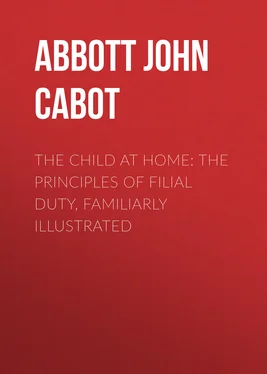John Abbott - The Child at Home - The Principles of Filial Duty, Familiarly Illustrated
Здесь есть возможность читать онлайн «John Abbott - The Child at Home - The Principles of Filial Duty, Familiarly Illustrated» — ознакомительный отрывок электронной книги совершенно бесплатно, а после прочтения отрывка купить полную версию. В некоторых случаях можно слушать аудио, скачать через торрент в формате fb2 и присутствует краткое содержание. Жанр: foreign_prose, foreign_edu, foreign_antique, на английском языке. Описание произведения, (предисловие) а так же отзывы посетителей доступны на портале библиотеки ЛибКат.
- Название:The Child at Home: The Principles of Filial Duty, Familiarly Illustrated
- Автор:
- Жанр:
- Год:неизвестен
- ISBN:нет данных
- Рейтинг книги:4 / 5. Голосов: 1
-
Избранное:Добавить в избранное
- Отзывы:
-
Ваша оценка:
- 80
- 1
- 2
- 3
- 4
- 5
The Child at Home: The Principles of Filial Duty, Familiarly Illustrated: краткое содержание, описание и аннотация
Предлагаем к чтению аннотацию, описание, краткое содержание или предисловие (зависит от того, что написал сам автор книги «The Child at Home: The Principles of Filial Duty, Familiarly Illustrated»). Если вы не нашли необходимую информацию о книге — напишите в комментариях, мы постараемся отыскать её.
The Child at Home: The Principles of Filial Duty, Familiarly Illustrated — читать онлайн ознакомительный отрывок
Ниже представлен текст книги, разбитый по страницам. Система сохранения места последней прочитанной страницы, позволяет с удобством читать онлайн бесплатно книгу «The Child at Home: The Principles of Filial Duty, Familiarly Illustrated», без необходимости каждый раз заново искать на чём Вы остановились. Поставьте закладку, и сможете в любой момент перейти на страницу, на которой закончили чтение.
Интервал:
Закладка:
His father had never known him to be guilty of falsehood before, and was so happy to find his son safe, that he did not doubt what he said was true. But, oh, how guilty, and ashamed, and wretched, did that boy feel, as he rode along! His peace of mind was destroyed. A heavy weight of conscious guilt pressed upon his heart. The boy went home and repeated the lie to his mother. It is always thus when we turn from the path of duty; we know not how widely we shall wander. Having committed one fault, he told a lie to conceal it, and then added sin to sin, by repeating and persisting in his falsehood. What a change had one short half day produced in the character and the happiness of this child! His parent had not yet detected him in his sin, but he was not, on that account, free from punishment. Conscience was at work, telling him that he was degraded and guilty, His look of innocence and his lightness of heart had left him. He was ashamed to look his father or mother in the face. He tried to appear easy and happy, but he was uneasy and miserable. A heavy load of conscious guilt rested upon him, which destroyed all his peace.
When he retired to bed that night, he feared the dark. It was long before he could quiet his troubled spirit with sleep. And when he awoke in the morning, the consciousness of his guilt had not forsaken him. There it remained fixed deep in his heart, and would allow him no peace. He was guilty, and of course wretched. The first thought which occurred to him, on waking, was the lie of the preceding day. He could not forget it. He was afraid to go into the room where his parents were, lest they should discover, by his appearance, that he had been doing something wrong. And though, as weeks passed away, the acuteness of his feelings in some degree abated, he was all the time disquieted and unhappy. He was continually fearing that something would occur which should lead to his detection.
Thus things went on for several weeks, till, one day, the gentleman at whose house he stopped called at his father's on business. So soon as this boy saw him come into the house, his heart beat violently, and he turned pale with the fear that something would be said that would bring the whole truth to light. The gentleman, after conversing a few moments with his father, turned to the little boy, and said, "Well, how did you get home the other day? My boys had a very pleasant visit from you." Can you imagine how the boy felt? You could almost have heard his heart beat. The blood rushed into his face, and he could not speak; and he dared not raise his eyes from the floor. The gentleman then turned to his parents, and said, "You must let your son come up again and see my boys. They were quite disappointed when he was there a few weeks ago, for he only staid about two hours, and they hoped he had come to spend the whole day with them." There, the whole truth was out. And how do you suppose that boy felt? He had disobeyed his parents; told a lie to conceal it; had for weeks suffered the pangs of a guilty conscience; and now the whole truth was discovered. He stood before his parents overwhelmed with shame, convicted of disobedience, and mean, degraded falsehood.
This boy was all the time suffering the consequences of his sin. For many days he was enduring the reproaches of conscience, when the knowledge of his crime was confined to his own bosom. How bitterly did he suffer for the few moments of forbidden pleasure he had enjoyed! The way of the transgressor is always hard. Every child who does wrong must, to a greater or less degree, feel the same sorrows. This guilty child, overwhelmed with confusion and disgrace, burst into tears, and implored his parents' forgiveness. But he was told by his parents that he had sinned, not only against them, but against God. The humble child went to God in penitence and in prayer. He made a full confession of all to his parents, and obtained their forgiveness; and it was not till then that peace of mind was restored.
Will not the child who reads this account take warning from it? If you have done wrong, you had better confess it at once. Falsehood will but increase your sin, and aggravate your sorrow. Whenever you are tempted to say that which is untrue, look forward to the consequences. Think how much sorrow, and shame, and sin, you will bring upon yourself. Think of the reproaches of conscience; for you may depend upon it, that those reproaches are not easily borne.
And is it pleasant to have the reputation of a liar? When persons are detected in one falsehood, they cannot be believed when they speak the truth. No person can place any more confidence in them till a long time of penitence has elapsed, in which they have had an opportunity to manifest their amendment. The little boy, whose case we have above alluded to, was sincerely penitent for his sin. He resolved that he never would tell another lie. But since he had deceived his parents once, their confidence in him was necessarily for a time destroyed. They could judge of the reality of his penitence only by his future conduct. One day he was sent to a store to purchase some small articles for his mother. In his haste, he forgot to stop for the few cents of change which he ought to have received. Upon his return home, his mother inquired for the change. He had not thought a word about it before, and very frankly told her, that he had forgotten it entirely. How did his mother know that he was telling the truth? She had just detected him in one lie, and feared that he was now telling her another. "I hope, my dear son," she said, "you are not again deceiving me." The boy was perfectly honest this time, and his parents had never before distrusted his word. It almost broke his heart to be thus suspected, but he felt that it was just, and went to his chamber and wept bitterly. These are the necessary consequences of falsehood. A liar can never be believed. It matters not whether he tells truth or falsehood, no one can trust his word. If you are ever tempted to tell a lie, first ask yourself whether you are willing to have it said that nobody can trust your word. The liar is always known to be such. A person may possibly tell a lie which shall not be detected, but, almost always something happens which brings it to light. The boy who stopped to play when on an errand two miles from his father's house, thought that his falsehood would never be discovered. But he was detected, and overwhelmed with shame.
It is impossible for a person who is in the habit of uttering untruths to escape detection. Your character for truth or falsehood will be known. And what can be more humiliating and degrading than to have the name of a liar? It is so considered in all nations and with all people. It is considered one of the meanest and most cowardly vices of which one can be guilty. The liar is always a coward. He tells lies, because he is afraid to tell the truth.
And how do you suppose the liar must feel when he comes to die? It is a solemn hour. Perhaps many of the children who read this book have never seen a person die. I have seen many. I have seen children of all ages dressed in the shroud and placed in the coffin. I might write pages in describing to you such scenes. One day, I went to see a little girl about ten years of age, who was very sick. When I went into the room, she was lying upon the little cot-bed, her lips parched with fever, and her face pale and emaciated with suffering. Her mother was standing by her bed-side, weeping as though her heart would break. Other friends were standing around, looking in vain for something to do to relieve the little sufferer. I went and took her by the hand, and found that she was dying. She raised her languid eyes to me, but could not speak. Her breathing grew fainter and fainter. Her arms and limbs grew cold. We could only look mournfully on and see the advances of death, without being able to do any thing to stop its progress. At last she ceased to breathe. Her spirit ascended to God to be judged, and her body remained upon the bed, a cold and lifeless corpse. All children are exposed to death; and when you least expect it, you may be called to lie upon a bed of sickness, and go down to the grave. There is nothing to give one joy in such an hour, but a belief that our sins are forgiven, and that we are going to the heavenly home. But how must a child feel in such an hour, when reflecting upon falsehoods which are recorded in God's book of remembrance! Death is terrible to the impenitent sinner; but it is a messenger of love and of mercy to those who are prepared to die. If you have been guilty of a falsehood, you cannot, die in peace till you have repented and obtained forgiveness.
Читать дальшеИнтервал:
Закладка:
Похожие книги на «The Child at Home: The Principles of Filial Duty, Familiarly Illustrated»
Представляем Вашему вниманию похожие книги на «The Child at Home: The Principles of Filial Duty, Familiarly Illustrated» списком для выбора. Мы отобрали схожую по названию и смыслу литературу в надежде предоставить читателям больше вариантов отыскать новые, интересные, ещё непрочитанные произведения.
Обсуждение, отзывы о книге «The Child at Home: The Principles of Filial Duty, Familiarly Illustrated» и просто собственные мнения читателей. Оставьте ваши комментарии, напишите, что Вы думаете о произведении, его смысле или главных героях. Укажите что конкретно понравилось, а что нет, и почему Вы так считаете.












